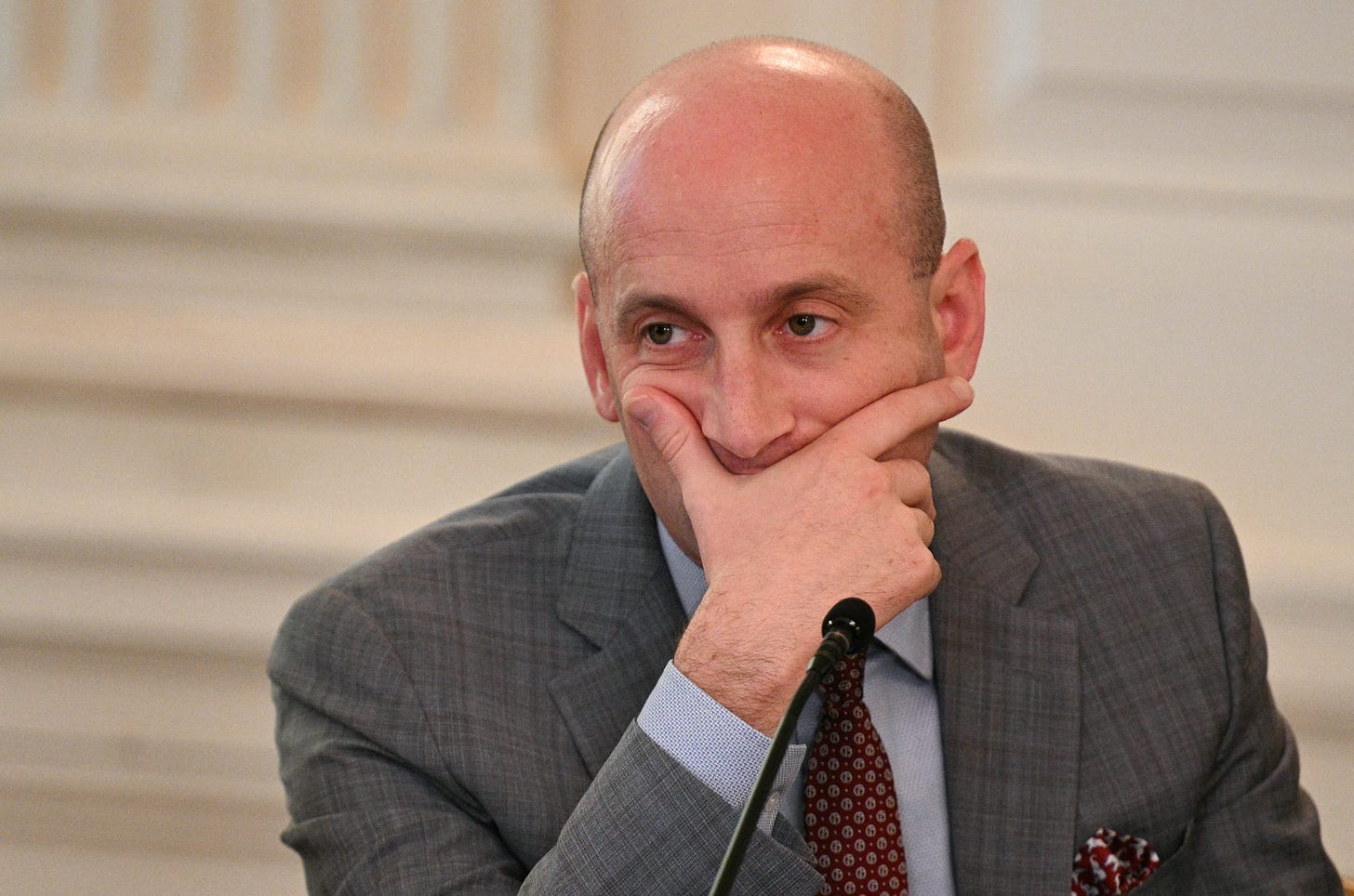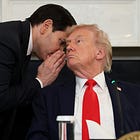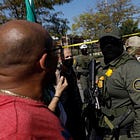Stephen Miller's radically bogus idea of "plenary authority"
This is not how the Constitution works.
Public Notice is supported by paid subscribers. Become one ⬇️
Last week, White House Deputy Chief of Staff Stephen Miller said the quiet part out loud on national TV, revealing in one moment just how much power Donald Trump is trying to seize for himself.
Miller was doing a CNN hit on October 6, after a Trump-appointed judge, Karin Immergut, blocked the administration from deploying the Oregon National Guard to Portland. Miller was humming along nicely here with his usual combination of petulance and arrogance when he was asked a simple question.
“You’ve called the district judge’s ruling blocking the deployment of the National Guard in Oregon ‘legal insurrection.’ Does the administration still plan to abide by that ruling?”
Miller was hyped to show off his big brain with a slick answer, but things went awry nearly immediately.
After blathering a bit about how the administration already filed an appeal to the Ninth Circuit and how it won at the Ninth Circuit over the deployment of troops in California, Miller says this: “Under Title 10 of the US Code, the president has plenary authority… ”
And then he stopped talking. And stopped moving, apparently in the hope CNN would just think his video froze, rather than that he was sitting there trying to unring the bell he just clanged live on television.
Watch:
CNN ultimately did Miller and the administration a solid by erasing evidence of the slip-up, with the official video on the network’s YouTube page now showing a glitch at the 10-second mark where Miller’s remark got disappeared.
But the internet is, of course, forever, so the plenary authority slip-up can still be viewed elsewhere (including in the HuffPost video embedded above).
So what’s the big deal about those two little words, and why does it give the game away? Well, because it’s an insanely sweeping, ahistorical, unconstitutional expansion of the powers of the president. And while the last nine months have been nothing but a myriad of sweeping, ahistorical, unconstitutional expansions of Trump’s power, even Miller seemed to recognize he’d gone too far.
“Plenary authority,” explained
“Plenary authority,” sometimes called “plenary power,” refers to areas of law where some body or official exercises complete control, with no limitations. It’s a thorny concept that can refer both to the ability to make laws and the ability to review government actions.
An example of the former is Congress’s power over immigration. Because Congress has complete authority in that arena, states cannot pass their own immigration laws. This played out recently when a lower court struck down — and the Supreme Court declined to overturn — a Florida law that made it a crime, with mandatory imprisonment, for “illegal entry” into the state. Controlling immigration, the lower court noted, has been an exclusively federal power for 150 years.
An example of the latter can also be found in the immigration context. There, the ability of the federal courts to review legislative and executive branch actions is quite limited. Practically speaking, this means the judicial branch typically has to defer to the other branches in reviewing any immigration matters.
So, if Miller had been answering a question about immigration law, it might not have been such a stretch to invoke plenary authority. But that wasn’t the question. The question was about Trump’s authority to federalize the National Guard under Title 10.
Title 10 is a giant chunk of the US Code that covers the armed forces and runs over 1,000 pages. It’s not really clear what part of Title 10 Miller was referring to when he slipped up, but presumably he was talking about Title 10, section 12406 of the US Code, which is what Trump has invoked in California, Oregon, and now Illinois. It allows the president to federalize a state’s National Guard in the event of an invasion by a foreign nation, rebellion against the government, or when the president cannot enforce federal laws with regular federal forces.
That section had always been read to require the consent of the governor of the state where troops are being federalized, but somehow the Ninth Circuit Court of Appeals, in addressing the deployment of troops in California, decided that it only meant the president had to tell the governor he’s doing it.
The Ninth Circuit also held that the president is entitled to a “highly deferential standard of review” as to his determination of whether there is an invasion, a rebellion, or that federal immigration personnel are unable to enforce immigration laws. But that deference is not absolute. In fact, the Ninth Circuit specifically rejected the argument that “the President could federalize the National Guard based on no evidence whatsoever, and that courts would be unable to review a decision that was obviously absurd or made in bad faith.”
That Ninth Circuit holding is what Judge Immergut relied on in her order blocking the federalization and deployment of National Guard members in Oregon. The government tried to justify sending troops to Portland by referencing violence in entirely different cities and vaguely handwaving that the Portland protests might get violent at some future point. Nope, said Immergut: “Violence elsewhere cannot support troop deployments here, and concern about hypothetical future conduct does not demonstrate a present inability to execute the laws using nonmilitary federal law enforcement.” That great level of deference, she said, did not require her to ignore the facts on the ground when Trump’s assertion that Portland was a ravaged war zone “was simply untethered to the facts.”
This is the basis for Miller’s fury. Even with the Ninth Circuit requiring that Trump’s fever dreams be treated with the most kid-friendly of gloves, the administration still couldn’t meet the bar. Miller’s contention that ICE officers in Portland “have to street battle against Antifa, hand-to-hand combat every night to come and go from their building” is objectively absurd. Courts cannot possibly be required to accept anything Trump says, no matter how disconnected from reality, as an adequate reason to send in the troops.
OK, so now let’s do a little Schoolhouse Rock separation of powers discussion, shall we?
To the extent Trump has the power to federalize troops, it stems from a law Congress passed. In other words, Congress could, were it not currently controlled by sniveling sycophants, just pass a new law that took away that power. So, by its very nature, that’s not a plenary power. Congress granted the president the power to federalize National Guard troops in certain settings, and it could take it away.
Similarly, even with the Ninth Circuit ruling that Trump’s determination was owed great deference, it did not say it was unreviewable. Since the federal courts have the power to review Trump’s invocation of Section 12406, albeit in a limited fashion, that cuts against the idea that Trump has plenary authority as well.
It bears mentioning that, despite Stephen Miller’s relentless attacks on lower court judges — including accusing them of tyranny, judicial coups, legal insurrection, and not understanding the Supremacy Clause — he is not a lawyer. He earned his BA in philosophy from Duke University in 2007, but his lack of credentials hasn’t stopped him from deciding he knows the law better than everyone else. He even lists himself as “co-founder” of America First Legal, a hideous little law firm that largely exists to drive everyone except white straight Christians out of public life.
One thing Miller is exceptional at, however, is pushing the envelope. Hence his absolutely unhinged musings about the president suspending habeas corpus, one of the most foundational parts of Anglo-American law. Petitioning for a writ of habeas corpus is the way immigrants can challenge their detention or removal, and it can only be suspended in cases of rebellion or invasion. Miller is way out over his skis, not just because no rebellion or invasion is happening, but also because only Congress can suspend habeas.
Checks and balances aren’t self-enforcing
Miller realized he slipped up by saying Trump has plenary authority under Title 10, but not because he thought he said something incorrect. He slipped up because even he knows it is an outrageous thing for Trump to claim absolute, unreviewable power to send active-duty military troops into American cities based only on his delusions. Miller, however, seems to genuinely believe Congress doesn’t have the power to check Trump in any fashion or that courts can review any of his actions.
And since Miller seems to be the shadow president, at least when it comes to immigration, you can likely assume there’s no one around to tell him he’s going too far.
It goes without saying that Miller’s view is pretty much the opposite of how American democracy works. The rest of us learned about checks and balances in high school, but that’s when Miller was busy being super-racist. If no other branch can place any restrictions on Trump, if his plenary authority is absolute, what’s the point of those other branches?
Sadly, that’s a fair question these days. The Republican majority in Congress has seen fit to stand aside while Trump seizes the power of the purse and unilaterally dismantles agencies Congress created. The Republican majority on the Supreme Court has seen fit to greenlight these power grabs, ignoring its own precedent and kneecapping the lower courts.
Stephen Miller froze up because he thought he’d given the game away, but with the other two branches of government abdicating their responsibility to check Trump, he’s more right than he should be.
That’s it for today
We’ll be back with more tomorrow. If you appreciate today’s PN, please do your part to keep us free by signing up for a paid subscription.
Thanks for reading, and for your support.








Stephen Miller did not slip. He revealed the playbook.
Invoking plenary authority in the context of National Guard deployment was not a legal argument. It was a power grab. From a behavioral lens, this is how authoritarian drift operates. Redefine terms. Test the boundaries. Count on institutional silence.
Checks and balances are not failing because they are weak. They are failing because too many actors have chosen not to act. When the judiciary defers and Congress abdicates, the executive expands by default.
Miller said the quiet part out loud. The real problem is how few people pushed back.
Thank you for keeping the lens sharp.
— Johan
Professor of Behavioral Economics and Applied Cognitive Theory
Former Foreign Service Officer
This column alone is worth the yearly subscription. Thank you, Lisa, for educating me and providing the receipts about the sneering rudeness of Miller ( and I thought Bondi was bad?).